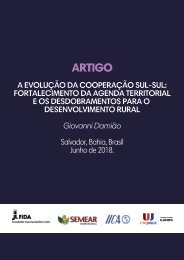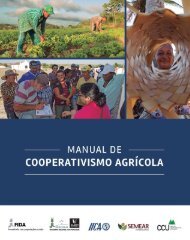The Evolution of South-South Cooperation
Since the Bandung Conference in 1955, the countries of the South have organized themselves in a structured way to achieve better levels of development. This article aims to present the evolution and recent trends of South-South Cooperation, showing how the historical dynamics have led the United Nations and its agencies to adopt a territorial approach, with a strong appeal to mobilize local actors. Allied to this, the increase of the independence of the actors that, with autonomy, manage to dialogue and conduct initiatives of cooperation outside the formal sphere of the central government. This article also aims to present rural development, agriculture and food security as essential factors for the development that since 1978, with BAPA (Buenos Aires Plan of Action), is one of the main thematic lines presented when it comes to the development of the southern agenda. Alongside this, the challenges presented by the prioritization of market dynamics in the face of social development, and how some of the multilateral agencies have worked to promote the facilitation of South-South cooperation and empowerment of minorities, in the achievement of governance as a strategy for endogenous and localized development
Since the Bandung Conference in 1955, the countries of the South have organized themselves in a structured way to achieve better levels of development. This article aims to present the evolution and recent trends of South-South Cooperation, showing how the historical dynamics have led the United Nations and its agencies to adopt a territorial approach, with a strong appeal to mobilize local actors.
Allied to this, the increase of the independence of the actors that, with autonomy, manage to dialogue and conduct initiatives of cooperation outside the formal sphere of the central government. This article also aims to present rural development, agriculture and food security as essential factors for the development that since 1978, with BAPA (Buenos Aires Plan of Action), is one of the main thematic lines presented when it comes to the development of the southern agenda. Alongside this, the challenges presented by the prioritization of market dynamics in the face of social development, and how some of the multilateral agencies have worked to promote the facilitation of South-South cooperation and empowerment of minorities, in the achievement of governance as a strategy for endogenous and localized development
Create successful ePaper yourself
Turn your PDF publications into a flip-book with our unique Google optimized e-Paper software.
<strong>South</strong>-<strong>South</strong> cooperation, to make it an effective way in development processes. <strong>The</strong> patterns for<br />
this kind <strong>of</strong> cooperation underwent much variation, the inclusion <strong>of</strong> multilateral actors and<br />
developed countries formed the so-called triangular cooperation, or trilateral cooperation, and the<br />
development localization processes led to the creation <strong>of</strong> territorially built projects, with a high level<br />
<strong>of</strong> participation <strong>of</strong> local actors and minorities4, with an emphasis on the role <strong>of</strong> women, who still<br />
face a historic challenge to fully participate in the integrated development process.<br />
In this context, the role <strong>of</strong> agriculture and <strong>of</strong> the development <strong>of</strong> rural communities as<br />
recurring theme in <strong>South</strong>-<strong>South</strong> and triangular cooperation should be highlighted. Since the BAPA,<br />
considering these factors is crucial and some challenges are observed in the conduct <strong>of</strong><br />
<strong>South</strong>-<strong>South</strong> cooperation strategies, especially with the emergence <strong>of</strong> States such as Brazil, which<br />
in its foreign policy, quite influential and focused on establishing closer ties with Africa, adopted an<br />
ambiguous behavior in the conduct <strong>of</strong> <strong>South</strong>-<strong>South</strong> cooperation. <strong>The</strong> country adopted the<br />
territorialization models and at the same time improved its relations with other countries, giving<br />
preferential attention to alliances with African States. Accordingly, it acted dubiously both on the<br />
fronts <strong>of</strong> social development and in promoting agribusiness for transnationalization <strong>of</strong> national<br />
companies, which, as a consequence, did not generate the expected effects with regard to the<br />
development <strong>of</strong> capacity and creation <strong>of</strong> structures to facilitate the consolidation <strong>of</strong> governance.<br />
However, the process <strong>of</strong> developing the <strong>South</strong> policies also presupposed intensifying the autonomy<br />
<strong>of</strong> subnational actors, which, overall, provided greater freedom for the existence <strong>of</strong> dialogue<br />
among the actors and the possibility <strong>of</strong> facilitating this process in the procedures <strong>of</strong> multilateral<br />
agencies, such as the International Fund for Agricultural Development (IFAD), which provides clear<br />
examples <strong>of</strong> the opening <strong>of</strong> dialogue channels for dissemination and consolidation <strong>of</strong> best<br />
practices.<br />
4 <strong>The</strong> inclusion <strong>of</strong> local actors stems from the creation <strong>of</strong> territorial policies aimed at facilitating the management <strong>of</strong><br />
development initiatives. Thus, these subnational and civil society actors started to be included in the dynamics <strong>of</strong><br />
territory management, as in the 2009 Brazilian policy, territories <strong>of</strong> citizenship.<br />
05




